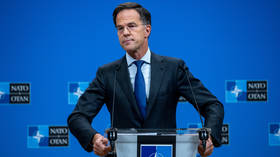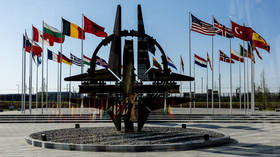Private military contractors: new way of waging war?
The U.S. security firm Blackwater USA has been at the centre of a scandal over the way it operates in Iraq. The Iraqi government has revoked Its licence following a firefight involving the company’s employees that left 11 civilians dead.
There have also been accusations of arms smuggling now investigated by U.S. Federal prosecutors. Blackwater employees were allegedly using the company’s channels for small arms transportation into Iraq to sell them on the black market.
RT’s military analyst Evgeny Khrushchyov looks at whether the private security industry is an asset or a liability for the White House.
With or without license, Blackwater USA is not going to fade away from Iraq, despite accusations of shooting civilians and smuggling weapons.
“We will review expeditiously the procedures, we will review how we carry our security and we will have in a commission with the Iraqis an open and transparent view on what’s going on,” announced U.S. State Secretary Condoleezza Rice referring to the criticism of Blackwater’s activities.
So it’s business as usual. Welcome to the business of private/public partnership in worst case scenarios.
Peter Singer, foreign affairs expert and Senior Fellow, Brookings Institution, believes it was inevitable: “You can't have over a 100,000 private troops running around a country and the government at some point say, 'hey we want to be in charge of it.”
Historically, hired guns or lances used to be called freelancers. Not any more. Now the opponents talk about mercenaries, soldiers of fortune or wild geese. Supporters disagree.
Tim Spenser, a former British colonel, pioneered the idea of re-branding the image of the industry and coined the new label: ‘Private Military Contractor’.
“The word ‘mercenary’ conjures up a picture in people’s minds of a rather ruthless unaligned individual, who may have some criminal, psychotic tendencies. We are not like that at all. All we really do is helping friendly, reasonable governments solve military problems,” he explains.
Backwater USA accepted this new name of the game but other insiders believe it’s inaccurate and dangerously misleading. Triple Canopy, a private sanctuary for Delta Special Forces veterans, insists on being called a ‘private security company’. They think it’s important to define the business strictly to protect and defend their clients and prevent speculation about military offensive operations.
“If you're going to have an effective peace or stability operation you got to have some sort of mechanism in place so that we can use these companies to our best need,” Doug Brooks from the International Peace Operations Association – a PMC's organisation, says.
In the murky waters of paramilitary NGOs, Blackwater USA has excelled in several ways. As the company’s founder Eric Prince put it: “We’re trying to do for the national security what FedEx did for the postal service.”
Blackwater USA company has emerged as a trend-setter in the security industry to get a piece of action from the CIA, in addition to the State Department and Pentagon. Thus, they have pushed the envelope overseas to cover the full spectrum of U.S. foreign policy.
The lingering question about this putative private/public partnership is who will lead the way and unleash the bounty killers on Al-Qaeda in Pakistan?













